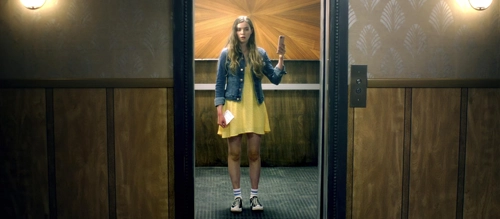Elevator Game (2023) Review

Elevator Game (2023)
Director: Rebekah McKendry
Screenwriters: David Ian McKendry, Travis Seppala
Starring: Nazariy Demkowicz, Liam Stewart-Kanigan, Gino Anania, Megan Best, Alec Carlos, Verity Marks, Madison MacIsaac
Urban legend horror movies have been a thing for a while now, including and going well beyond the Urban Legend franchise itself. Candyman (based on “The Forbidden” by Clive Barker) is the best of these films, taking a traditional urban legend and turning it into a horror institution. These legends are the myths of old, transfigured into modern morality tales, cautioning children to obey their parents. Break the rules and see what happens. In the 1970s, the BBC made several public information advertisements, the most famous being that of the ‘Spirit of Dark and Lonely Water’, a hooded wraith-like figure voiced by Donald Pleasance, warning children not to play near stagnant pools or rivers, lest the spirit drown them. It is still scary today. It’s the upgrading of the monster in the closet, the beast in the cupboard under the stairs. Very conservative in traditional values, they present a supernatural reason not to do something stupid and obey law and order.
It seems that the writers of Elevator Game – when deciding to create a horror film inspired by a real-world ‘Elevator Game’, involving someone going to different floors to try and open a portal into the otherworld – should have obeyed the rules their parents gave them: don’t do something stupid and try to make Candyman-in-an-elevator, because we all know how it’s going to turn out. Not good.
More infuriating than the awful expository dialogue, where one of our characters lists all the reasons to keep their web series on paranormal games and rituals going, to their faces, as an excuse to give us their names and backgrounds, is how little moments of decent writing manage to find their way into the film. When Chloe (Verity Marks) gives her phone number to the new intern, Ryan (Gino Anania), she puts her name in his phone as ‘Chloe The Awesome’. This little moment of humour, never addressed, never brought up (and indeed her name on his phone when she rings is just ‘Chloe’, showing that even the makers forgot about it), is a small detail of a pearl of humanity in a wash of cliches and derivative celluloid. This is perhaps the only good moment aside from the direction of the cold open, which is efficiently minimalist and, though cliched, executed effectively. We even see a little remnant of those ancient origins of the urban legend, when the character Becky uses her phone to see the ghost standing behind her, mirroring Perseus using his polished shield to behead Medusa without looking at her. If only these ideas, the evolution of older myths into the stories of today, could have remained.
But no, that would be asking too much. The writing makes no sense, as is to be expected of these cheap, small, teen ghost movies, where the mechanics and laws of their avenging spirit are not thought out and/or communicated effectively with the audience. The key antagonist, the spirit itself, seems to come from only a few decades ago, relying on a ritual with its rules made up seemingly long before her death. Whether there are other spirits around is never fully explored. The strange otherworld has elements of the specific elevator being used for trying to open a portal, despite it being said in the film that any elevator can be used. This suggestion that the dark realities mould themselves to the specifics of someone’s entrance is interesting, and the shifting nature of this universe would be far more unique, and theoretically and philosophically engaging, than the bland, derivative drivel we are given.
Elevator Game’s ghost has a tendency to jump around from place to place to take out whomever she wants to, or, whomever the plot wants her to, seemingly leaving some people alive at the moment she could kill them. She loves setting up random bad jump scares. She can’t decide whether to play with her victims for over half an hour or kill them within ten seconds of breaking her rules. And, at the end of the film, the makers give us a final little scare (if one can call it a scare) despite it making no sense in accordance with the rules of the movie itself.
This film probably got financed because it feels similar to a spate of other low budget shockers that have ended up on Netflix and Amazon and the like, to be heard of only when everything else has been watched and then forgotten. ‘It can get onto Netflix,’ they said in the pitch. ‘It’s a viable investment.’ It certainly wasn’t funded through the strength of the writing, the originality of the script, the incredible strength of the visuals, the outstanding acting of the cast (who are about OK most of the time, if that’s a half positive), or the terror of the thematics. It’s Cube meets Candyman, and an insult to both of them to mention this film in the same breath.
Score: 5/24
Recommended for you: Candyman (2021) Review

